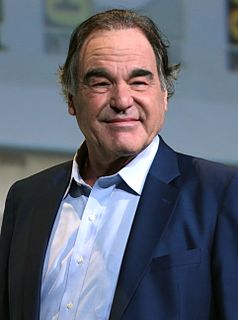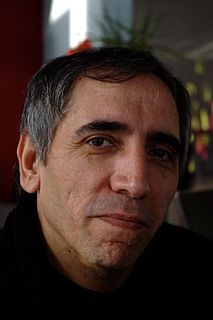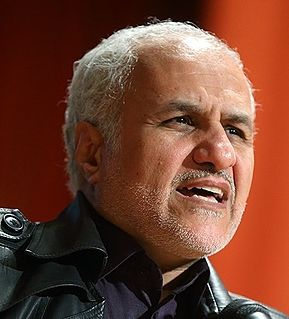| Javad Shamaqdari جواد شمقدری | |
|---|---|
Javad Shamaqdari in 2013 | |
| Born | January 5, 1960 Mashhad, Iran |
| Nationality | Iranian |
| Occupation | Film director Screenwriter Politician |
| Years active | 1983–present |
| Known for | Deputy Minister of Culture (2009–2013) |
| Website | www.javad-shamaghdari.ir |
Javad Shamaqdari (Persian : جواد شمقدری; born January 5, 1960) is an Iranian filmmaker and the former deputy culture minister of film under President Mahmoud Ahmadinejad. He has attacked the film 300 as psychological warfare and accused American 'cultural authorities' and Hollywood of attacking Iranian culture. [1]

Persian, also known by its endonym Farsi, is one of the Western Iranian languages within the Indo-Iranian branch of the Indo-European language family. It is primarily spoken in Iran, Afghanistan, and Tajikistan, Uzbekistan and some other regions which historically were Persianate societies and considered part of Greater Iran. It is written right to left in the Persian alphabet, a modified variant of the Arabic script.

The President of Iran is the head of government of the Islamic Republic of Iran. The President is the highest ranking official of Iran. The President carries out the decrees, and answers to the Supreme Leader of Iran, who functions as the country's head of state. Unlike the executive in other countries, the President of Iran does not have full control over anything, as these are ultimately under the control of the Supreme Leader. Chapter IX of the Constitution of the Islamic Republic of Iran sets forth the qualifications for presidential candidates. The procedures for presidential election and all other elections in Iran are outlined by the Supreme Leader. The President functions as the executive of the decrees and wishes of the Supreme Leader. These include signing treaties and other agreements with foreign countries and international organizations, with Supreme Leader's approval; administering national planning, budget, and state employment affairs, as decreed by the Supreme Leader. The President also appoints the ministers, subject to the approval of Parliament, and the Supreme Leader who can dismiss or reinstate any of the ministers at any time, regardless of the president or parliament's decision. The Supreme Leader Ali Khamenei directly chooses the ministries of Defense, Intelligence and Foreign Affairs, as well as certain other ministries, such as the Science Ministry. Iran’s regional policy is directly controlled by the office of the Supreme Leader with the Ministry of Foreign Affairs’ task limited to protocol and ceremonial occasions. All of Iran’s ambassadors to Arab countries, for example, are chosen by the Quds Corps, which directly reports to the Supreme Leader.

Mahmoud Ahmadinejad is an Iranian politician and statesman who served as the sixth President of Iran from 2005 to 2013. He was also the main political leader of the Alliance of Builders of Islamic Iran, a coalition of conservative political groups in the country.
He has since rebuffed American film director Oliver Stone's offer to make a film about President Ahmadinejad, saying Iran would only allow it if an Iranian director was allowed to make a film about George W. Bush. Like 300, Stone's 2004 biopic Alexander was controversial in Iran for its depictions of ancient Persians.

The United States of America (USA), commonly known as the United States or America, is a country composed of 50 states, a federal district, five major self-governing territories, and various possessions. At 3.8 million square miles, the United States is the world's third or fourth largest country by total area and is slightly smaller than the entire continent of Europe's 3.9 million square miles. With a population of over 327 million people, the U.S. is the third most populous country. The capital is Washington, D.C., and the largest city by population is New York City. Forty-eight states and the capital's federal district are contiguous in North America between Canada and Mexico. The State of Alaska is in the northwest corner of North America, bordered by Canada to the east and across the Bering Strait from Russia to the west. The State of Hawaii is an archipelago in the mid-Pacific Ocean. The U.S. territories are scattered about the Pacific Ocean and the Caribbean Sea, stretching across nine official time zones. The extremely diverse geography, climate, and wildlife of the United States make it one of the world's 17 megadiverse countries.

William Oliver Stone is an American writer, filmmaker and conspiracy theorist. Stone won an Academy Award for Best Adapted Screenplay as writer of Midnight Express (1978). He also wrote the acclaimed gangster movie Scarface (1983). Stone achieved prominence as director/writer of the war drama Platoon (1986), for which he won the Academy Award for Best Director and the film received Best Picture. Platoon was the first in a trilogy of films based on the Vietnam War, in which Stone served as an infantry soldier. He continued the series with Born on the Fourth of July (1989)—for which Stone won his second Best Director Oscar—and Heaven & Earth (1993). Stone's other notable works include the Salvadoran Civil War-based drama Salvador (1986); the financial drama Wall Street (1987) and its 2010 sequel Money Never Sleeps; the Jim Morrison biographical film The Doors (1991); the satirical black comedy crime film Natural Born Killers (1994); and a trilogy of films based on the American Presidency—JFK (1991), Nixon (1995) and W. (2008). His latest film is Snowden (2016).

George Walker Bush is an American politician and businessman who served as the 43rd president of the United States from 2001 to 2009. He had previously served as the 46th governor of Texas from 1995 to 2000.
In April 2012, he responded to "What Must Be Said" with a letter to Günter Grass: "I have read your literary work, highly responsible both from a human and historical point of view, and I found it extremely timely. Telling the truth in such a way may truly awaken the west's silent and dormant conscience". [2]
"What Must Be Said" is a 2012 prose poem by the German writer Günter Grass, recipient of the 1999 Nobel Prize in Literature. The poem discusses an alleged threat of annihilation of the Iranian people and the writer's fears that Germany's delivery to Israel of a sixth Dolphin class submarine capable of carrying nuclear warheads might facilitate an eventual Israeli nuclear attack on Iran, and thus involve his country in a foreseeable crime.

Günter Wilhelm Grass was a German novelist, poet, playwright, illustrator, graphic artist, sculptor, and recipient of the 1999 Nobel Prize in Literature.












